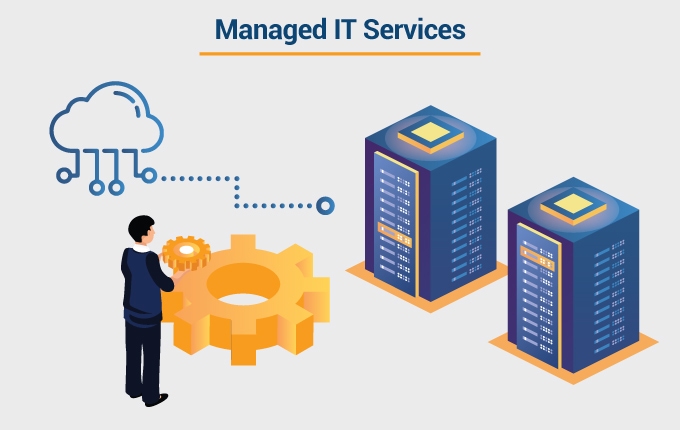IT Consulting & StrategyTech Support & Managed IT ServicesConstructionEducationFinanceHealthcareLegalReal Estate
The managed service model is a new way of delivering IT expertise and support. Because it’s so new, we often encounter businesses that don’t fully understand what a managed IT service provider (MSP) is or what it can do for them. To help promote a better understanding of what we do for our clients, we wrote this comprehensive FAQ. Enjoy!

1. What does managed IT services mean?
Managed IT services is when a third party proactively monitors and maintains a company’s IT infrastructure for a flat monthly fee, ensuring worry-free operations and eliminating the uncertainties of hourly IT consulting services. The model is based on the idea that a stable network provides companies with the greatest returns while increasing profitability for the provider — aligning client and vendor objectives.
2. What are the benefits of managed IT services?
Managed IT services stabilize your technology, helping you increase productivity and control costs. By providing dependable 24/7 support and full access to a team of senior IT specialists, a reputable managed IT service firm provides your businesses with worry-free network technology that helps you better focus on your core competencies.
3. What do managed service providers do?
Managed IT service providers give you everything you need to approach IT with confidence. This includes the full range of technology services, from proactive network support and software or OS updates to cybersecurity service, disaster recovery planning, cloud management, and more. In addition, a quality MSP will regularly meet with your decision-makers to help you strategically plan your IT to help achieve your business goals.
4. How does a managed service provider work?
MSPs blend on-site and remote support in a single solution. This begins with an analysis and on-boarding process to solve any chronic problems. After this work is finished, the MSP will start to proactively maintain your network infrastructure and systems using remote monitoring and maintenance tools. They’ll also provide help desk service to handle daily IT support issues.
5. How much do managed IT services cost?
Most reputable managed IT service providers give their clients a single monthly bill that includes all the onsite and offsite support they need. A small group of leading MSPs has eliminated the hourly bill, basing their fee on the number of devices supported, the number of users in the client’s organization, or another standard.
6. What is the difference between managed services and outsourcing?
Managed IT services is a holistic approach that gives businesses comprehensive IT support in a single solution, with a strong focus on a long-term partnership. IT outsourcing, on the other hand, is focused on handing individual services over to an external provider to relieve a single business problem, sometimes on a project-based basis.
7. What is the difference between managed services and professional services?
Managed services is a comprehensive solution that’s designed to provide long-term benefit. It provides everything a business needs in terms of IT support, including network and software updates, help desk support, and proactive network monitoring. In contrast, professional services have a clearly defined scope of work, and often feature a definitive begin and end date.
8. What is the difference between consulting and services?
Consulting is project-based work that helps a business either achieve an IT goal or prepares them to face an oncoming challenge. It identifies a problem then offers a solution. IT services are focused on the practical steps of implementing and managing technology systems, including infrastructure management, business, and technology alignment, as well as day to day maintenance.
9. What are IT consulting services?
An IT consulting company analyzes a client’s network infrastructure, then provides advice on how to improve on a technology system, make a strategic IT investment, or solve a business problem. Many managed IT services firms provide their clients with a virtual chief information officer (vCIO), which offers this consulting service in addition to regular network maintenance and support.
10. Why do we need managed services?
Managed IT service providers help businesses by supporting every aspect of their network technology, from handling major infrastructure projects to dealing with day to day issues. Having a trusted IT partner to relieve them of all their technology problems makes businesses more confident about embracing new technology while streamlining the efficiency of their workforce.
11. Why do companies outsource IT services?
There are many good reasons to outsource IT services. Companies that outsource get instant access to the full range of IT capabilities, allowing them to reduce costs, greatly increase network reliability, and mitigate cyberattack or server crashes with confidence — all without the cost of hiring internal staff. Outsourcing also helps companies implement new technologies with ease.
12. What are the disadvantages of outsourcing?
Outsourcing to a managed IT service provider means you won’t have direct, immediate access to your entire IT staff. While some companies find the lack of control and communication an obstacle to outsourcing IT services, most reputable managed IT service providers offer ways to help mitigate those concerns, such as 24/7 human support and regular on-site meetings.
13. How are managed services useful?
Managed IT services help you relieve pressure from internal staff and discover new levels of stability. As businesses become more reliant on IT, many have discovered that having a managed IT service provider to take the complexity out of their technology helps them better focus on their core business and more confidently achieve target KPIs.
14. Why are managed services better?
The managed IT services model is better than older methods of delivering IT support, such as the “break-fix” model because it provides businesses comprehensive management for every aspect of their technology in a single flat-rate solution. This flat-rate pricing aligns the interest of the provider and client, giving both parties a strong financial incentive to maintain maximum network uptime.
15. What is in a managed services contract?
Many managed IT service providers will offer a service-level agreement in their contract, which outlines what levels of network uptime you can expect when using their service. Because SLAs can be used to mask service deficiencies, MSPs like Manhattan Tech Support have replaced these SLAs with risk-free commitments that allow unhappy clients to switch providers without penalty.
Manhattan Tech Support – An MSP that NYC Trusts
For over 20 years, Manhattan Tech Support has been helping businesses in New York City realize higher levels of network uptime, streamline business processes, and be more productive with world-class IT. If you’re a business in the greater New York City area that wants to get the most from your technology, we encourage you to get in touch. The friendly Manhattan Tech Support staff is always available to answer your questions!
Contact us any time at [sales-phone], or by email at [email-address].



 December 27, 2019
December 27, 2019 Homefield IT
Homefield IT

